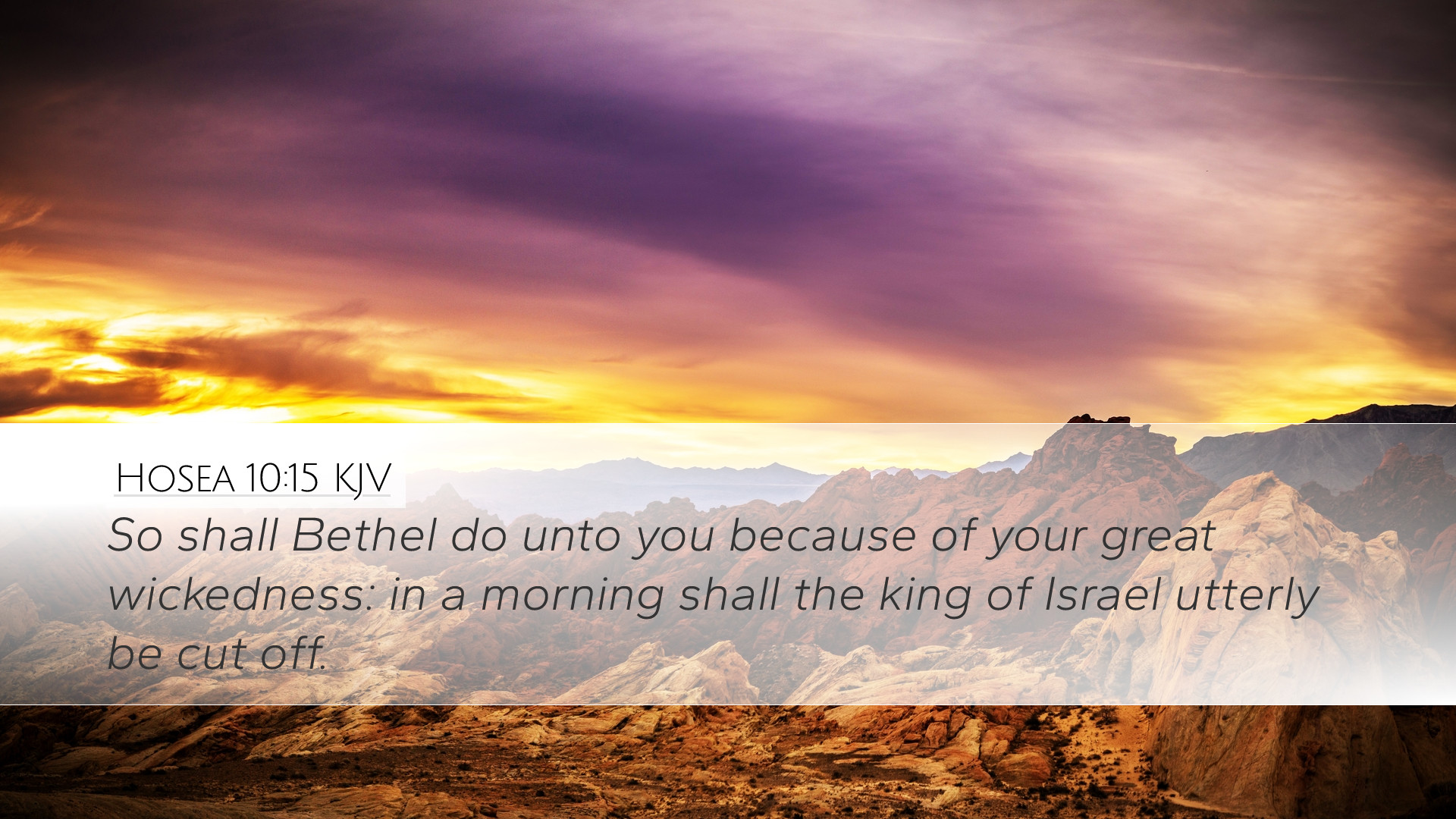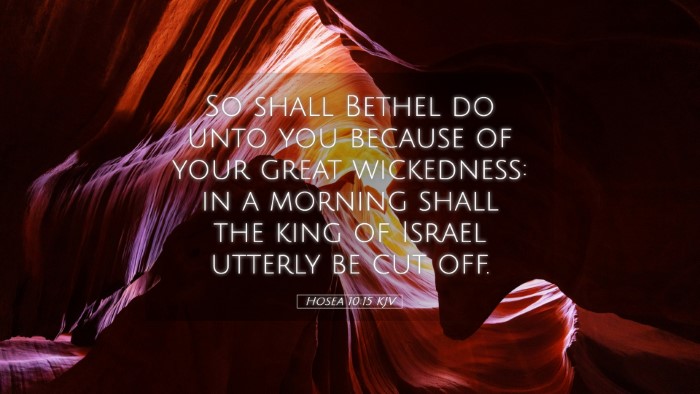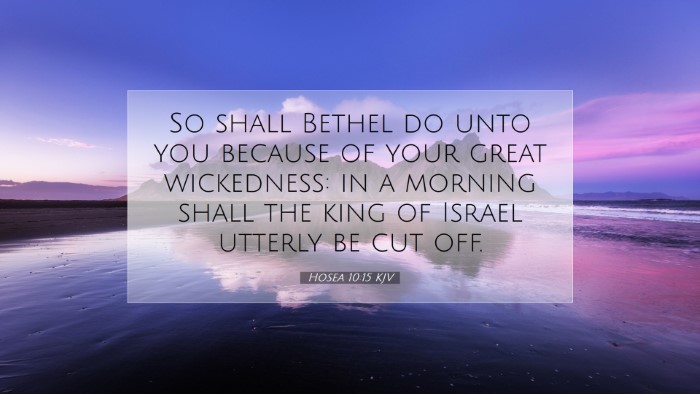Old Testament
Genesis Exodus Leviticus Numbers Deuteronomy Joshua Judges Ruth 1 Samuel 2 Samuel 1 Kings 2 Kings 1 Chronicles 2 Chronicles Ezra Nehemiah Esther Job Psalms Proverbs Ecclesiastes Song of Solomon Isaiah Jeremiah Lamentations Ezekiel Daniel Hosea Joel Amos Obadiah Jonah Micah Nahum Habakkuk Zephaniah Haggai Zechariah MalachiHosea 10:15
Hosea 10:15 KJV
So shall Bethel do unto you because of your great wickedness: in a morning shall the king of Israel utterly be cut off.
Hosea 10:15 Bible Commentary
Commentary on Hosea 10:15
The verse Hosea 10:15 states:
"So shall Bethel do unto you because of your great wickedness: in a morning shall the king of Israel utterly be cut off."
This verse serves as a culmination of God's judgment against Israel, particularly focusing on the consequences of their transgressions and the futility of their reliance on false worship in Bethel.
Contextual Overview
Hosea prophesied during a time when Israel was steeped in idolatry, political instability, and moral decay. The Northern Kingdom, particularly Bethel, was a center for the worship of golden calves, which were established as substitutes for proper worship of Yahweh. The backdrop of this verse includes the looming threats from Assyria and the internal corruption that plagued Israel.
Theological Implications
Hosea 10:15 conveys several theological themes relevant to understanding God’s character and His relationship with Israel:
- Judgment and Accountability: This verse reflects the principle of divine retribution. The Israelites are warned that their wickedness will lead to destruction, highlighting that God holds His people accountable for their actions, especially those pertaining to idolatry.
- The Futility of False Worship: Bethel represents the hub of syncretism in Israel. The warning that "Bethel shall do unto you" illustrates that reliance on false worship leads to ultimate ruin. They cannot expect protection or favor from a place built upon disobedience.
- Political Consequences: The phrase "in a morning shall the king of Israel utterly be cut off" denotes sudden and severe political turmoil. This reflects the instability in leadership that results when a nation turns away from God.
Insights from Public Domain Commentaries
Matthew Henry
Matthew Henry emphasizes the assurance that God’s judgments are certain and inevitable when a nation strays from His path. He remarks that the cutting off of the king marks not only a political upheaval but also a spiritual bereavement, indicating the severance of God’s covenantal relationship with Israel as a result of their wickedness.
Albert Barnes
Albert Barnes analyzes the connection between the moral state of the people and the downfall of their leaders. He points out that the "morning" could symbolize the dawn of judgment, suggesting that the repercussions of their actions will come swiftly, much like the end of night brought about by the morning light. Barnes also underscores that Israel’s leaders have led the people astray, thus diminishing their spiritual heritage.
Adam Clarke
Adam Clarke notes that the term "Bethel" carries a weighty significance in the Hebrew narrative. It was originally a site of divine encounter and promise, but now it has devolved into a site of apostasy. Clarke observes that this transformation is emblematic of Israel’s moral decline, and the destruction foretold serves as a reminder of how far they have strayed from the original covenant.
Lessons for Today's Believers
This passage is not merely an ancient judgment of Israel but carries profound lessons for contemporary believers:
- Repentance and Return: The clear message is a call to repentance. Just as Israel faced dire consequences for their idolatry, modern believers are reminded of the need to examine their own lives for any form of idolatry that distracts from true worship.
- The Importance of Godly Leadership: The spiritual state of a nation can be strongly influenced by its leaders. It is essential for those in positions of authority to uphold Godly principles and guide the people towards righteousness.
- Hope Amidst Judgment: While this passage expresses severe judgment, it is also a part of a larger narrative of ultimately God's redeeming love. He desires reconciliation rather than destruction, and this should inspire both hope and proactive faith in the present.
Conclusion
Hosea 10:15 is a poignant reminder of God's holiness and the necessary consequence of sin. It calls believers, pastors, and theologians alike to reflect on the solemn nature of idol worship, the significance of righteous leadership, and the need for a committed return to faithful obedience to God. As we contemplate the depths of this verse, it invites us into a deeper understanding of our own covenant relationship with God and the importance of fidelity to His ways.


